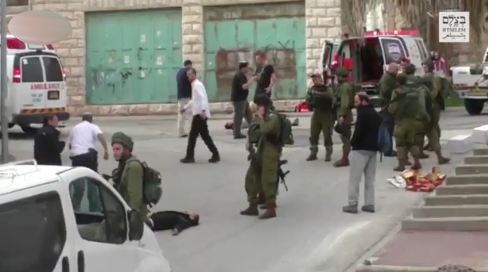Israel is sizzling in the aftermath of a dramatic and violent videotaped encounter between a Palestinian stabber and the Israeli soldier who killed him. The stabbing, which started similarly to the dozens of other attacks in the surging wave of terror Israel has been facing throughout the last three months, ended up as an issue threatening to tear the country apart. Let me bring you up to date. On Thursday, March 24th, two Palestinian men armed with knives stabbed a soldier who was guarding a post in the city of Hebron. They were both shot down by his fellow soldiers. However, several moments after they were neutralized, another soldier was seen cocking his weapon, aiming it at one of the wounded Palestinian stabbers who was lying motionless on the road and fatally shooting him in the head.  (Above - the stabber in black lying on the ground, seconds before being shot. The solider is shown cocking his weapon)
(Above - the stabber in black lying on the ground, seconds before being shot. The solider is shown cocking his weapon)
Advocates for the shooter say that he suspected the terrorist had a suicide belt and acted to protect his friends and bystanders. However, it is clear from the video -- and commander's testimonials -- that the threat was already neutralized before the fatal shot. Furthermore, the shooter was heard responding to his commander, who questioned his action, "A terrorist who comes to kill my friends deserves to die." The Israeli Defense Force has officially condemned the incident, citing that it is not in line with the values and morals on which the army was founded. Israel's Prime Minister, Benjamin Netanyahu, initially denounced the shooting but later backtracked from his statement -- no doubt due to the growing public pressure to "stand by our brave soldiers" -- and even called the shooter's family to express his support. During the 10 days since the incident, the country has been divided in a heated, boiling debate. Two polarizing views were quickly formed: those who are horrified by the act, calling for the soldier to be unequivocally punished for what they call "a clear execution," and those who stand by him, calling for his complete acquittal. A parliament member was shown on TV defending the soldier. When the interviewer challenged her with the blatant facts, she became emotional, citing the pressure and stress the soldier was exposed to during the incident as a sufficient reason to acquit him from the looming charges. This is not the Israel I know and migrated from 18 years ago. For two decades I've watched how the Israeli-Palestinian conflict slowly -- and methodically -- eroded Israel's own sense of identity, as well as moral and social structure. As a reminder, this is a country that in 1993 chose to spare the life of John Demjanjuk -- an originally convicted Nazi war criminal -- despite the overwhelming evidence that he was, indeed, "Ivan the Terrible". Although Israeli Capital Punishment is reserved specifically for genocide (and used only once since the country was established), a "reasonable doubt" prevented the Israeli Supreme Court from allowing Demajanjuk to be executed. In their ruling, they wrote: "The matter is closed - but not complete, the complete truth is not the prerogative of the human judge." Human judges are plentiful in Israel these days; social media is exploding with pleas to release the soldier who is facing a likely indictment. The country is torn between those shocked by the sheer horror and immorality of the documented act and those who side with the Talmudic principle that says "if a man comes to kill you, rise early and kill him first." On this issue, Israel is facing itself in the mirror, forced to ask itself who it is as a nation. Will it reduce itself to the moral values of its attackers while citing the French idiom "all fair in love and war" or will it refuse to succumb to fear, seeing its own true nature beyond the open, gaping, bleeding wound? One thing is certain. The bullet released from the soldier's weapon inflicted a fatal injury; not just to the young Palestinian stabber -- who died on the spot -- or to the young shooter's chance of living a normal, happy life, but to Israel's own moral consciousness. The later victim is still struggling for its life. It alone will choose whether to recover, growing stronger and wiser, or to perish while bleeding out the values on which it was founded.
